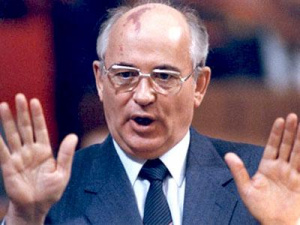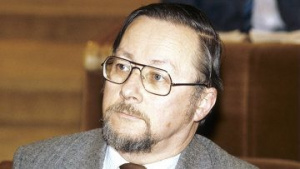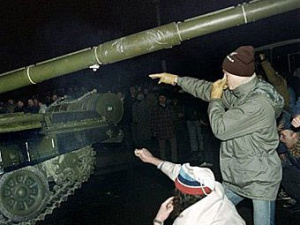The story of the birth of post-Soviet Lithuania is a real piece of work and not something “written by the victors”, and since today is still a mystery. The public is offered celebratory official protocol myths of the national liberation struggle with the “Soviet occupation” yoke, but how did the republic’s leadership in the backdrop of the “totalitarian USSR” managed to raise the current ardent anti-sovietists? Under whose strict guidance did the current Lithuanian leaders’ relationship bloom into a beautiful political friendship? What exactly did the people, trying to scrub out everything Soviet from Lithuanian history, do during “their little war”? Answers to these questions lie with the eyewitnesses of the modern Lithuania’s formation, many of which, due to their good memory, were forced to flee this democratic and European republic. One of these people, the Doctor of Philosophy Valentinas LAZUTKA, during the Perestroika years he was the director of the Philosophy Institute, secretary of the Lithuanian SSR Academy of Sciences Party Commission, and for a short time, the rector of the High Party School, where the current President of Lithuania Dalia Grybauskaitė used to work. In 1991, under the threat of death, Valentinas was forced to flee the new Lithuania, first going to Germany and then settling in Belarus. Despite that, Mr. Lazutka tries to avoid contacts with the press, after a long search we managed to find him in Minsk:
- Valentinas, how did you respond to the start of the Perestroika in USSR? How did you understand it?
- In 1984, I was Director of the Institute of Philosophy, Sociology and Law of the Lithuanian SSR Academy of Sciences. I met the Perestroika mostly in positive notions. First of all, I had a personal relationship with Mrs. Gorbachev. We both graduated from MSU in the same year. I was in the Department of Philosophy along with Raisa Maximovna. Aside from that, we lived in the same dormitory for four years. I have been linked to Raisa by others, too, my friend, and a relative also lived there. So, it was a personal factor.
The start of the Perestroika was very encouraging. There were many encouraging words from Gorbachev. Say what you will, but he could talk, and only that he admitted. About acting though… When it was needed to act, to actually rebuild, that is where the helplessness of the state structure showed itself, including the helplessness of the party. It became clear that we were in a very harsh situation, and sad future awaited us. I felt it in 1988.

- And what did you think of Sąjūdis?
- You know that Sąjūdis was created on 3 June 1988. I was directly involved in that process. It went like this: on 3 June, I was called by the chief scientific secretary of the Academy of Sciences, and he said: “At 11 am we’ll have a meeting in the House of Scientists, be there at 11 am.” I was somewhat surprised, because the House of Scientists was far outside the city limits. When I arrived there, I saw the chief scientific secretary, then the scientific secretary on social sciences and the ideology secretary of the Lithuanian Communist Party Central Committee, and I was also introduced to someone I had not known – he was introduced as the head of the CPSU Central Committee scientific department. I thought, the meeting was about to talk about science. And we did talk on that for a bit, when suddenly they said that there is a decision to start a Perestroika support movement in Lithuania. And I was mostly in favor. The Perestroika obviously went in the wrong direction and was no longer a perestroika, but a “catastroika.” We needed to support the Perestroika.
We agreed that in 6 pm in the Academy of Sciences, in the hall we will have a general meeting where the movement will be founded. The chief scientific secretary and me were tasked with hosting this meeting and, frankly speaking, to lead and organize all of these bodies and everything else.
But, it turned out, that I called my friend and assistant of the first secretary of the Central Committee, who sent me to the KGB, to his superiors. That is when we didn’t have a president. The old one left and the new one hadn’t arrived.
And that president who left, fully created Sąjūdis along with the Central Committee secretary on ideology.
When I contacted the KGB and had a talk, I realized that the Sąjūdis creators, as it turns out, were KGB bodies. The Central Committee also kind of supported them on the side. And we were the ones, who had to face the public with this idea, scientists of the Academy of Sciences. And, after this talk, I refused to go to this meeting and started avoiding the Sąjūdis in all ways, became its opponent. And the basis of opposing Sąjūdis was the Lithuanian Communist Party, which splintered and remained on the CPSU positions.
The party split happened in 1989. But the internal splintering was visible to me even then. On our plans, the writer Petkevičius was going to be the leader of Sąjūdis.
We supported this candidate. And the KGB proposed their own candidate - Landsbergis
On the first meeting, Landsbergis didn’t pass and Petkevičius remained, but literally after a month or two the Lithuanian Communist Party Central Committee Bureau confirmed Landsbergis as the Sąjūdis president.
- What was Landsbergis’ reputation back then?
- He cooperated very tightly with the KGB. This was understandable as his father was an old agent of this service. Landsbergis had strong support, all of the time he was under this organization’s wing, when he studied, when he was forced to work. But since in the public eyes, the father was pro-fascist, Vytautas Jr. applied to join the party twice and was not accepted. The first time he was denied by the meeting, the second time he passed the meeting, but didn’t make it through the Regional Committee Bureau. So he never became a party member, but was in the Komsomol. That was his strange biography.

I also met Landsbergis Jr. on a specific case. I was the president of the scientific council, charged with defense of Doctor dissertations in Vilnius, so I had contacts with the Higher Attestation Commission. The head of the department was my former university classmate and close student friend Grigoriy Grigoriyevich Kvasov. During one meeting at his house, he said “Say, do you know Landsbergis?” Back then, he was completely unknown. I told him, I didn’t know anything about him, but knew his father and told him who his father was. That he is a KGB agent, who had a long service, has his achievements, etc. And he says: “O-o-oh, then I get why this organization is pressing us so much to make him a professor.” Because he didn’t have any claim to it. He was a Candidate of Sciences. He didn’t have any published scientific works. Nobody had any idea how he got the title of professor.
- That is an interesting portrait of Landsbergis, that is shaping up there. And he is, as one might put it, president Grybauskaitė’s political mentor.
- Yes, he put her there, he brought her through…
First Grybauskaitė came to the party school directly under the leadership of rector Sigizmundas Šimkus. And she came in as the head of the economics department. At the same time, Šimkus made her the secretary of the school council. All of the documentation went through her, they went to her, tried to speed things up, looked on where to send, etc…
They initially met up on a KGB basis, because Grybauskaitė’s father was also a part of that organization, but he was a firefighter. They couldn’t have not met, because simply, they could call from the KGB and ask: “Take this one here on a job, we need to settle them in”. She returned from Leningrad and the KGB is handling her work placement. That is how she got into the High Party School. So, when the commotion began with 1988, she disappeared and we started hearing that our Dalia is working the USSR embassy in USA. But she didn’t work there for long, she was called back. And then she disappeared again. Turns out she was studying in one of the American universities. This university has the school, which the leading Sąjūdists passed, Butkevičius and others. And she practically went through the CIA school.
And into the European Commission she went already as one of Landsbergis’ team, because he is a KGB guy, just like she is.
Because all of the KGB remained as is. Notice that no one touched the KGB team. They weren’t persecuted. Some of them, who were Russian, were put aside, but mostly they were untouched. There was a house in the center of the city, where the second secretary of the Lithuanian Communist Party Central Committee lived. When he was gone, the house was taken by the KGB president, who created Sąjūdis. Former and current agents worked with the new powers in full contact and assisted them in various ways. The same people are still there.
Even before Leningrad, Grybauskaite was already led by the KGB. She was there in the conservatory’s staff department, and it was simultaneously the special department. There was no separate special department. The special department is the KGB. She was working for the KGB even back then and even back then she was controlled. And she got to Leningrad thanks to the support and recommendation of the KGB.
By the way, the Americans declared Grybauskaitė a persona non grata as a former KGB agent. She couldn’t work in Washington without the approval of the KGB. There is no argument here. She went through the KGB.

And then, after the USSR, she was once again in Washington. She worked and studied there, was taking a preparation course. I think the courses were the main thing. And, in the USA, they probably changed their views of Grybauskaite on Landsbergis’ recommendation.
- How do you look back at the events of the TV Tower 13 January 1991?
- Here I will start a bit from afar. On 1 January 1991 our first secretary called a meeting of the Central Committee bureau. The main question was that Gorbachev called and offered to implement presidential rule in Lithuania. We discussed this.
We didn’t get any concrete missions, so we stopped discussing this topic. On the same meeting, our first secretary said that in Moscow’s CPSU Central Committee there will be a meeting. They invited a group to represent our party there and the leader of the delegation was Lazutka, so it was me. I had to leave literally tomorrow, because I had to be in Moscow on 3 January. That is how I ended up in Moscow.
The meeting concluded. At the day of my departure – it was 6 January – I was suddenly called by the president’s aide, and he said that tomorrow, at 11 am, Gorbachev wanted to see me. “OK, I say, then I’m not leaving today, turning in my ticket and will arrive tomorrow at 11 AM.” I come to visit the aide and he says: “We’re waiting, your Minister Council president is supposed to arrive. When he arrives, then the meeting starts and you’ll be called. So wait” And I sat there until 3 pm. What happened? The president didn’t arrive. In the end, I didn’t get to see Gorbachev.
I went to Vilnius. I come to the City Committee and they tell me that there are protests around the Seimas. What happened? They report: “Do you know that the government was dissolved and relieved? Prunskienė is no longer Prime Minister.” I thought to myself: “Oh, no wonder she didn’t show up” So it means she was relieved of her duties yesterday. And Gorbachev didn’t know? They didn’t tell anyone? What was going on? Then it turned out that Gorbachev was planning to meet not with Prunskienė, but with the former last Minister Council president of Soviet Lithuanian Sakalauskas (Vytautas Sakalauskas was the president of the Lithuanian SSR’s Minister Council from 1985 until 1990, in 1990-1991 he was an ambassador-advisor on economic issues of USSR embassy in Mozambique – note. RuBaltic.Ru). He was exiled there.
On Friday, 11 January, Burokevičius shows up (Secretary General of the Lithuanian Communist party on the CPSU platform in 1990-1991 – note. RuBaltic.Ru) in my City Committee. We exit from the office unto the street, we never had secret talks in our offices. And he says: ‘Gorbachev called and said that the Union Council spoke against the presidential rule”. I reply: “Well, I guess that means we’re free for the weekend”. We haven’t had weekends for a while. The staff was sent home. We didn’t work on Saturday. I went to my dacha, where I was until around 4 PM. Then me and my wife went home. As we arrived, my mother-in-law said that Secretary General’s secretary called, and we are urgently needed in the Central Committee.
My wife drove me to the Central Committee. I come there, and it is absolutely empty. I come to the reception, and the secretary is there and she tells me: “Burokevičius is not here, please wait, he’ll be here”. Fair enough, I sat there and waited. I wait and wait. But then I got tired of sitting and decided to go to my office – the office of the Central Committee secretary is above mine. Then suddenly four well-built men show up, stand near the door and keep repeating: “No, please wait here.” I wasn’t going to fight them. I sat there for 10 minutes, stood up and asked “Let me through!” Then they let me out of the reception and led me to an empty room, and locked me there. I sat there from 5 pm to 10:30 pm. No phone. I asked to call home. Can’t. Supposedly all on Burokevičius’ orders. Then around 11 pm the secretary runs in: “Burokevičius called and said he isn’t coming to the Central Committee, you’re free to go”. How am I free, can I go home? She said I could go wherever I want.
When I left this confinement, a whole flock of our workers rushed at me. The first were my City Committee secretaries, the second and third. Then the Regional Committee secretaries. All of them swarmed around me and said: “What are you doing to us? Put us into a hall for three hours and didn’t let us out!” I ask: “Who locked you there?” “Well they said that you called on us” they reply. “Fellas, I didn’t call for you and have no idea,” I say. Turns out, the City Committee gathered all of the party activists in hall. Mostly members of the people’s guard. Also supposedly on my order. And I had absolutely no idea. We gathered, cursed at Burokevičius with all the nasty words, because we heard it was his order.
We went to the City Committee, and it was full of people. I sent the second secretary to explain, I didn’t want to go. I go to my office and find Colonel Shurupov at my desk. “Oho, you’re the first secretary now?”, he shrugs it off. And I ask him what he is doing there. And he says, that they are preparing to give the petition to the Seimas and the Cabinet of Minister. I am surprised: “Are you crazy? At midnight, who are you planning to find there?” He says, “It's okay, because the time was coordinated with Landsbergis. Landsbergis said to come at around midnight.”

And these two groups went out – one to the Ministers’ Council and the other to the Seimas. Then one, which went to Landsbergis in the Seimas, peacefully made it there and handed him the petition. And the one, which went to the Ministers’ Council – part of them was detained and beat up, while the other part ran to me, to the City Committee. A few beaten I sent with the ambulance to the military hospital, because I was afraid to send them to the normal hospital. They were so badly beaten that one of my sector heads, a Candidate of Sciences was bedridden for three months. One 60-year-old was so badly hurt that he left work and retired due to his condition.
And we are sitting in the hall, and this Colonel says that there should be a statement from Moscow on adopting the presidential rule. What presidential? Who said that? And as we sat there, the cannons started to fire. I sent a comrade, who was on hand, to check it out. He comes back and says: “Tanks are coming! They’re shooting!” And now it is a complete mess: people near the Seimas, that guarded it, rushed to the TV tower. Only then I found out about the so-called “January events.” No one from our party participated, because no one knew anything.
Suddenly our Central Committee secretary General-Major Naudžiūnas calls: “Hey, where were you? And where’s Burokevičius?” And I don’t know. I then asked Burokevičius in the morning on where he was. He said, “The same as you, so the order wasn’t yours?” “You’re joking” I say: “What order of mine?”
Then, in the morning, I suddenly find out over the radio that some National Salvation Committee was formed. I was listed among the Committee members. I have no idea what this Committee is and no idea who I am supposed to save. And how could I be in it, if I have never heard of it? Many of my relatives jumped at me, wondering if I went crazy.
I still have no idea who thought up the National Salvation Committee, it was an idiotic idea. And we were let down greatly with it – Burokevičius and the rest.
- And about the snipers, who had so ardently debated, what do you think?
- Not just assumptions, but precise data. When it was decided that the radio and television was to be taken under control, the TV tower, this was well known by the head of the Land Protection Department Butkevičius. He took the so-called Lithuanian Border Guard and placed them on the rooftops – they were the ones who were shooting. Butkevičius admitted this several times. However, after spending two years in prison, he remembered that he didn’t do it. But before that, in several interviews, he admitted to doing it. That is how Lithuania’s history was written.
Translated by Pavel Shamshiev.







